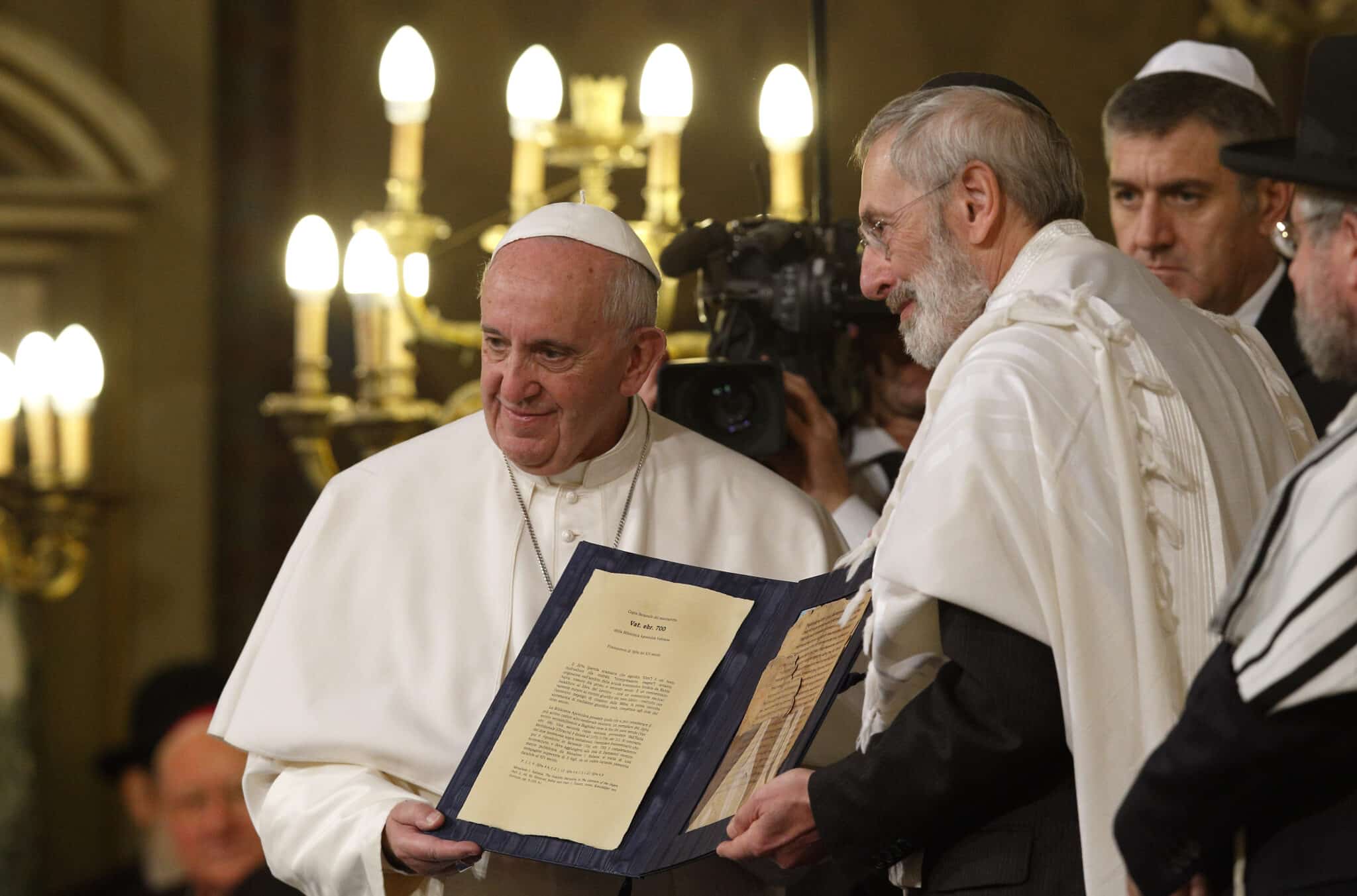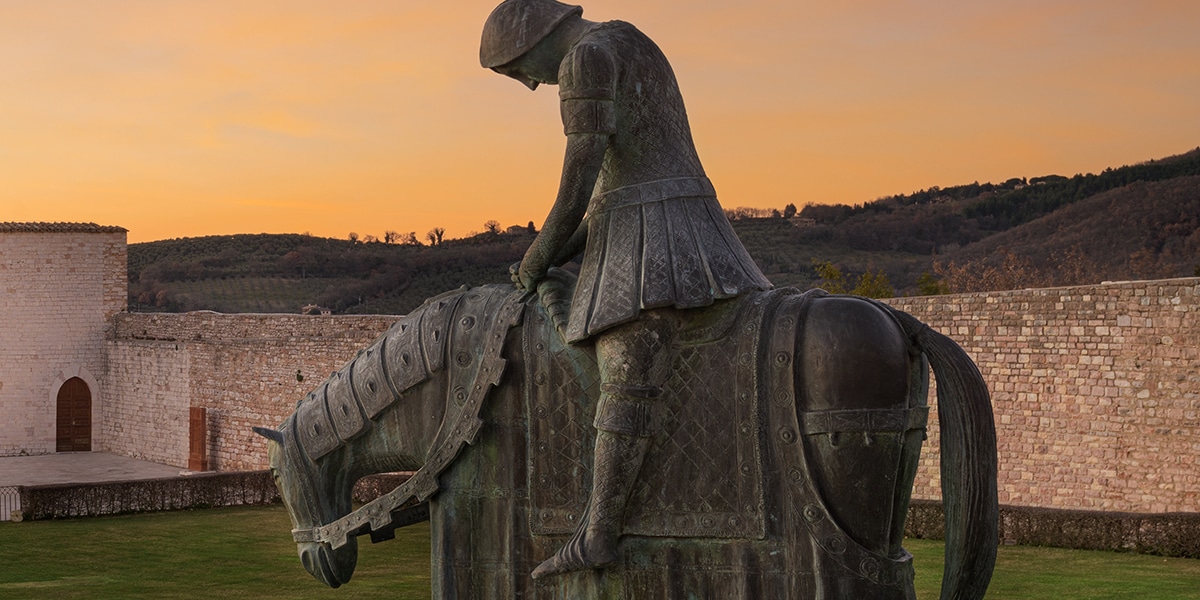“Ten, ” responds Eugene Fisher instantly when asked to rate the current state of Catholic-Jewish relations in the United States. At the National Conference of Catholic Bishops (NCCB) in Washington, D.C., he heads the office for these relations. St. Anthony Messenger interviewed him at the Secretariat for Ecumenical and Interreligious Affairs.
Fisher ranks Catholic-Jewish relations worldwide as, “Five or six, depending on the country a little higher in a country like Italy or England. We’re still working at it in some other places. ”
More than 25 years of work on formal (institutional) and informal dialogues have given him a unique perspective on this topic. Some of his 20-plus books, as well as over 250 articles for Christian and Jewish journals, have been translated into other languages. His most well-known book is Faith Without Prejudice: Rebuilding Christian Attitudes Toward Judaism(revised edition, 1993). To some extent Fisher’s professional and personal concerns merge since he and his wife, Cathie, want their 10-year-old daughter, Sarah, to grow up in a world characterized by faith without prejudice.
Getting Started in the Field
A fascination with Scripture led him to the Catholic-Jewish dialogue. “I was in the seminary for a while, ” he explains. “I left and got a master’s degree in theology from the University of Detroit. The opportunity came up to go to New York University’s Institute of Hebrew Studies. Before that I had some very good courses in Scripture and it seemed to me perfectly appropriate to study the Bible with the people who wrote it.
“The program was really Jewish studies so I took courses, for example, in Jewish history, medieval Jewish prayers and philosophy. Every time I turned around there was something new. Somehow in all my years of Catholic education, I had missed a lot of material directly relevant to the development of Western religious civilization. You can’t understand that story without telling the history of Judaism and its thought. ”
Fisher earned a doctorate in Hebrew Culture and Education from New York University in 1976. His dissertation evaluated the treatment of Jews and Judaism in 16 Roman Catholic textbook series. He found the treatment had improved since a 1958 dissertation investigating the same topic. While serving as director of catechist formation for the Archdiocese of Detroit, Fisher taught at the University of Detroit and at St. John’s Seminary in Plymouth, Michigan.
In 1966, Father Edward Flannery began the NCCB office for Catholic-Jewish relations. Fisher has directed it since 1977 and has helped write many national and international statements on Catholic-Jewish relations.
In 1967 the U.S. bishops approved, he says, “the first set of guidelines for Catholic-Jewish relations in the whole 2,000-year-long history of the Church. ” These guidelines implemented Vatican II’s Declaration on Relations With Non-Christian Religions, which taught about the Catholic Church’s relationship with Judaism and officially rejected any idea that the Jewish people bear collective guilt for Jesus’ crucifixion.
US Dialogue Crucial
The Catholic-Jewish dialogue has been extremely important in the United States, home to 5.7 million Jewish people, more than Israel’s 4.7 million or the rest of the world’s 2.6 million Jews (1997 statistics). About 60 percent of American Jews are religiously affiliated in some way. Approximately 90 percent of these are either Reform or Conservative; the other 10 percent are Orthodox. Fisher points out that the worldwide Jewish population is currently about five million less than it was when World War II began.
Years of dialogue since 1966 have brought results. “We cleared up a huge problem about what’s in Catholic teaching, especially in the textbooks. Frankly, the situation is spottier in the pulpits because priests are always dealing with the New Testament. Not all priests are well trained in handling those problematic passages. Sometimes they do a good job and sometimes they don’t. Nothing personal, just my perspective as someone sitting in the pews, ” Fisher says with an easy, yet no-nonsense smile.
His office is working with the bishops’ Committee on the Liturgy on a missalette text about Good Friday. The statement will paraphrase Vatican II’s teaching about responsibility for Jesus’ death.
“The Gospel is proclaimed in the context of a rather long and tragic history, ” explains Fisher. “Preachers need to take that into account, not pretending that all those terrible things never happened. For example, in Rome for centuries the popes closed off the ghetto and put guards around it to protect the Jews from mobs coming out of churches after Good Friday services. Catholic leaders should have said, ‘Maybe we’re doing something wrong in the churches if our people on Good Friday come out wanting to beat up Jewish people. This isn’t right.’ It took the Second Vatican Council to address that issue. ”
Fisher has also been active in the wider Christian-Jewish dialogue around the United States, serving as national chairman for the National Workshop on Christian-Jewish Relations (1983-present) and participating in all subsequent national workshops. Since 1983 he has edited the ecumenical events section of theJournal of Ecumenical Studies and has been a consultant for several movies and TV productions.
International Dialogue Improving
Fisher knows the international situation well. Since 1981 he has been a consultor for the Holy See’s Commission for Religious Relations with the Jews. Beginning in 1985, he has been one of the Holy See’s representatives on the International Vatican-Jewish Liaison Committee, which meets every two or three years around the world. In 1995 he joined the international advisory committee of the Interreligious Coordinating Council in Israel.
According to Fisher, the state of Catholic-Jewish relations worldwide may be the best it has been since the time of Jesus, certainly in the last thousand years. “When you start off the last millennium with the crusaders in 1096 slaughtering tens of thousands of Jews in the Rhineland area and then go to the concentration camps during World War II, it wasn’t a very good millennium! ”
One problem has been Catholic understanding of the New Testament. “Chapters nine through eleven of Paul’s Letter to the Romans, ” Fisher points out, “are the only place where the New Testament takes a consistent look at the relation of the Church and the Jewish people in light of the history of salvation. Let’s build it up from there. Unfortunately, some Catholics have understood that relationship on a past-tense basis. The 1970 edition of the New American Bible erroneously translated a passage referring to the Jews as ‘theirs were the adoption, the glory, the covenants⦒ but it has been corrected to read ‘theirs are the adoption, the glory, the covenantsâ¦.’ (9:4). That’s how bad we had gotten: mistranslating the New Testament to continue a polemic that is not in the New Testament!
“Since the Emperor Constantine in the fourth century, there has never been an age when Jews and Christians could face each other, eyeball to eyeball, in the context of perfect freedom, working for dialogue and mutual respect. From the fourth century on, Christians have had too much power. ”
Individuals Make a Difference
Catholic and Jewish leaders are vital for improving this dialogue, says Fisher, singling out Pope John Paul II, Cardinals Bernard Law, Anthony Bevilacqua, Roger Mahony and William Keeler, as well as the late Cardinals Joseph Bernardin and John O’Connor. Liturgy Training Publications (Chicago) has published a collection of Bernardin’s writings on Catholic-Jewish relations.
“O’Connor sent a wonderful message to Jewish leaders before the High Holy Days last year, ” says Fisher. “Elie Wiesel and others got his permission to print it as an ad in The New York Times. That impressed many Jewish people and others. Last Yom Kippur, Cardinal Mahony went to a synagogue and spoke very well. Cardinals Bevilacqua, Law and Keeler have normally issued very good statements to the Jewish community, statements which are picked up in the Jewish press but not in the secular press.
“The pope got attention when he went to the Great Synagogue of Rome, ” Fisher points out. “The ability of personalities to capture the attention of society’s means of communication is very important. People need these symbolic moments. The Holy Father is very good at that. He speaks for the Church, as well as to the Church.
“Without such moments, many people don’t understand how things have changed. Most Jews don’t realize how much Catholic textbooks have improved since 1965. Catholics going through a religious education program or a Catholic school today are certainly presented with a more positive understanding of Jews and Judaism than most Catholic students received before Vatican II. ”
Fisher identifies the most prominent Jewish dialogue leaders in the United States as Rabbis James Rudin (American Jewish Committee) and Leon Klenicki (Anti-Defamation League). Other major leaders in this dialogue include Rabbis Mordecai Waxman, Joel Zaiman and Michael Signer (National Council of Synagogues representatives for the dialogue with Catholics), as well as Walter Wurzburger and Fabian Schonfeld (of the Catholic dialogue with Orthodox Judaism). Fisher says that Rabbis Joseph Erenkrantz (Institute for Jewish-Christian Understanding, Sacred Heart University, Fairfield, Connecticut) and Irving Greenberg (chairman of the U.S. Holocaust Memorial Museum Committee) have made major contributions to this dialogue.
Rabbi Zaiman co-led with Cardinal Keeler a national pilgrimage of U.S. bishops and rabbis to Israel and Rome in 1998. There have been three such trips organized on the national level and still more locally.
“One of the most important phenomena in the last 10 or 15 years, ” Fisher explains, “is the development of numerous institutes, many but not all of them attached to Catholic institutions of higher learning. ” There are Jewish-Christian institutes in Baltimore, Chicago, Detroit and Manchester, New Hampshire, as well as in Allentown, Pennsylvania. Spertus College of Judaica (Chicago) named an institute after Cardinal Bernardin.
Developing Greater Trust
“Each time the Catholic Church makes an official statement about Judaism, the Jewish community responds. It identifies further things that could be said or things that could be said better. This is helpful and important. After 2,000 years it would be ridiculous to assume we would get it right within a mere 30 years, especially as regards the Holocaust. ” Fisher explains that the Bishops’ Committee for Ecumenical and Interreligious Affairs is working on a document about Holocaust education.
“Christians need to remember that from the time of Constantine on, Jews lived as the only tolerated non-Christian community in Christendom, ” says Fisher. “That worked fairly creakily up until 1096 when the First Crusade was beginning; then things got rather nasty. By the 12th century, England had expelled the Jews, followed by Germany, France and Spain. All those expulsions were really contrary to Church law, but the rulers didn’t care. There were forced conversions in Spain, leading to the Inquisition because Catholic political and religious leaders thought the conversions weren’t sincere. Papal law protected the Jews in Italy.
“The Enlightenment meant that ghetto walls were broken down. One hundred and fifty years later, the Holocaust occurred. Jewish trust of the Christian-dominated societies in which they live declined. During the Holocaust, two out of every three Jews alive in Europe in 1939 were murdered. That was one out of three in the whole world!
“On the international level, Jewish trust of the Vatican can be fragile. It’s different on the neighbor-to-neighbor level. There’s not a lack of trust there. Most Jews look at Vatican documents very seriously. Msgr. George Higgins, a U.S. veteran of this dialogue, says that if an elephant is in bed with a mouse, the mouse is going to have an extremely nervous night. It will never get a good night’s sleep! There are a billion Roman Catholics and only 13 million Jews in the world. We’re still somewhat of an elephant. History has taught the Jews not to be excessively trustful of Christian promises. ”
State of Israel’s Role
“The State of Israel has been very important for this dialogue internationally, ” says Fisher. “After the Holocaust it has given Jews a necessary sense of security; they’ve got someplace to go. They had no place to go during World War II. Nobody would let them in, including the United States of America. To some extent Israel’s existence is a psychological refuge for all Jews. That’s important because Israel’s survival gives Jews a different image of themselves instead of perpetual victims. That is healthy.
“Lack of diplomatic recognition between Israel and the Holy See once negatively influenced Catholic-Jewish relations. That obstacle disappeared with the 1993 decision to establish diplomatic relations. In a sense, issues around the Holocaust have replaced the earlier problem: action or inaction of Pope Pius XII, canonizing Edith Stein, problems of the Auschwitz convent. All these Holocaust-related controversies have to be talked about and worked through.
“We Christians need to acknowledge our history, including the negatives which the Jews remember. I think that eventually Jews will be able to see that their own history includes some things they learned from Christianity over the centuries. That may be the next step down the road. For that we will need to develop greater trust. More times than we would care to admit, Christians have abused their political power over Jews. Not as often or as consistently as Jews remember because they tend to remember the negatives better than the positives. That’s understandable. ”
Facing Today’s Most Sensitive Issue
Nothing is more crucial for Catholic-Jewish dialogue today than finding the truth about the Holy See’s actions toward Jews before and during World War II. In November 1999, a Catholic-Jewish team was appointed by the Vatican and the International Jewish Committee for Interreligious Consultations to examine the Vatican archives relating to World War II. The Holy See has asked Fisher to serve as Catholic coordinator for the group, which had very productive meetings last December and in May.
The Catholic members all work in the United States (Dr. Eva Fleischner, Father Gerald Fogarty, S.J., and Father John Morley). The Jewish members work in Canada, Belgium and Israel (Doctors Michael Marrus, Bernard Suchecky and Robert Wistrich, respectively).
“I would hope that this group will work as long as it takes them, ” explains Fisher. “We’ve got six top-notch people, all of whom have lives, ” he says with a laugh. “There’s no hurry. This is about doing it right. ”
The team has begun by examining a 12-volume series published between 1965 and 1981. Each member wrote a report on two volumes before the May meeting. This 12-volume series about the Holy See and World War II may lead the team to request additional material, perhaps at the Vatican, perhaps elsewhere.
“With few exceptions, most of the people complaining about opening up the Vatican archives on this subject haven’t looked at the thousands of documents the Holy See has already published, ” says Fisher.
Hopes for the Future
Eugene Fisher has come a long way since the days when he was frequently the only Christian in a class of Jewish teachers and students. Because many of his classmates at New York University had mistaken presumptions about Christianity, in 1973 he wrote “Typical Jewish Misunderstandings of Christianity, ” his first article in a field soon to become his life’s work.
“This dialogue has certainly made me a better Catholic, ” Fisher says, “both in knowing my roots and in learning how to witness with Jews to the Name of the One God. ”








